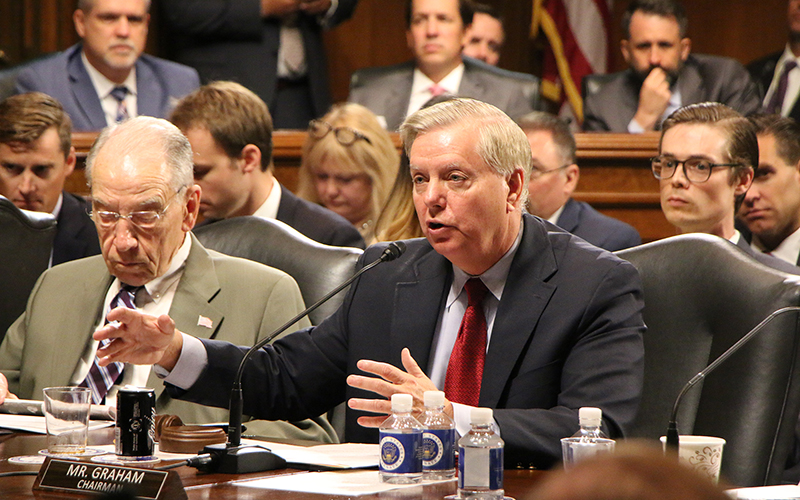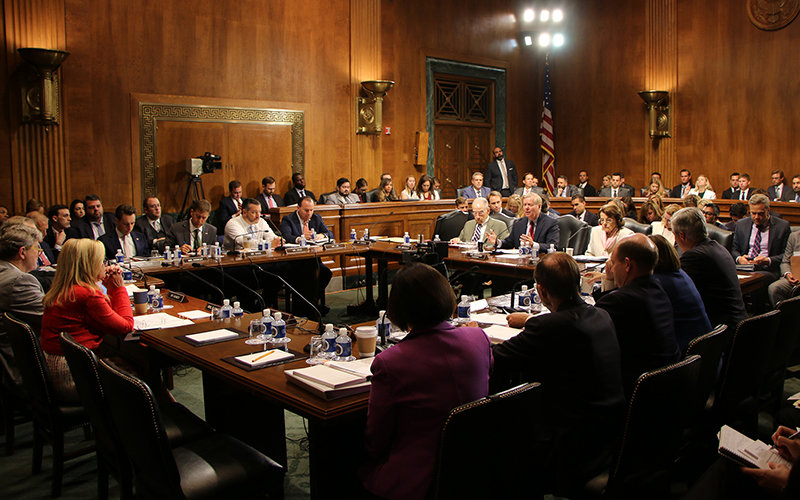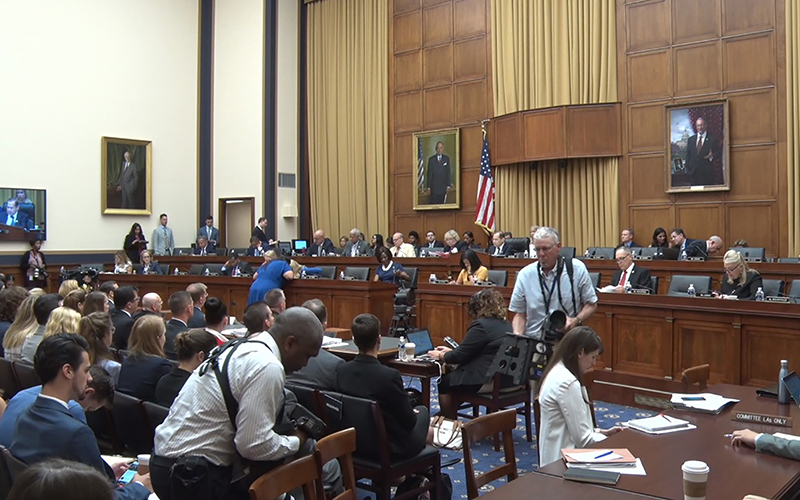
Sen. Lindsey Graham, R-South Carolina, accused Democrats of stalling on a bill to address the crisis at the border, but Democrats said the bill being pushed by Republicans would do more harm than good and would not get through the House. (Photo by Miranda Faulkner/Cronkite News)
WASHINGTON – The Senate Judiciary Committee pushed through a Republican-backed asylum reform bill on a party-line vote Thursday over the strident objections of Democrats, who were blocked from offering amendments to it.
The Secure and Protect Act of 2019 would force migrants to apply for asylum at new facilities outside the U.S., increase the number of days immigrant children can be held in detention and add 500 new immigration judges, among other changes.
Democrats blasted Sen. Lindsey Graham, the committee chairman, whom they accused of breaking committee and Senate rules when he ignored more than 100 proposed amendments to the bill, leaving the panel as what one called little more than a “Donald Trump Committee.”
“If the majority can decide any given moment to ignore the committee’s rules, precedents and principles, then this committee is nothing but a conveyor belt of ultrapartisan ideas under the thumb and control of Donald Trump,” said Sen. Patrick Leahy, D-Vermont, dramatically ripping up a copy of the committee’s rules.
But Graham said he had already held the bill for almost two months in hopes of working with Democrats, who last week stayed away from a committee hearing in order to prevent a vote on the bill. The South Carolina Republican said he would not let Judiciary become a “dead-end committee” and, pointing to the crisis at the border, he said now is the “time for us to move forward and get this bill out of committee.”
“The problem is getting to be unmanageable,” Graham said of the situation at the border. “We are all concerned about the humanitarian conditions, that’s why we supported a $4 billion appropriation to supply better housing. But we have done nothing to stop the flow, until today.”
The vote came as the Senate prepared to leave town Friday and join the House on recess for the month of August.
Apprehensions of immigrants at the southern border are at the highest level in more than a decade. Customs and Border Protection officials reported taking in more than 780,000 migrants through June, putting the agency on pace to apprehend more than 1 million by the end of fiscal 2019 on Sept. 30.
Unlike in previous years, many of the immigrants are families with children and the majority are coming from Central America – making them much more difficult to care for and to repatriate to their home countries than migrants stopped in previous years.

In a tense hourlong meeting, the Senate Judiciary Committee voted along party lines to approve an immigration reform bill that would restrict the process of applying for asylum and extend the time that migrant children can be held in custody. (Photo by Miranda Faulkner/Cronkite News)
The numbers have overwhelmed the government’s ability to process and care for immigrants, leading to news reports and inspector general audits that find overcrowding, overworked employees, unsanitary and unsafe conditions.
Graham noted that immigration courts currently have a backlog of 900,000 cases, meaning that migrants are often released into the U.S. with an order to appear in court on a date that is likely years down the road.
He said Homeland Security officials have told him that his bill could stop 70 to 90% of the flow of migrants from the Northern Triangle countries of Guatemala, Honduras and El Salvador.
One key to the bill is its reform of the Flores decision, a court settlement that says immigrant children can be held for no more than 20 days. Graham’s bill would allow minors traveling with their families to be held for up to 100 days, and expedite removal proceedings of families with a goal of settling their cases within those 100 days.
Because the government no longer separates families, critics say the effect of Flores has been to release the entire family within 20 days, which has opened the door to abuse of the system.
“These rules and the way they are abused, without the necessary reforms that we’re proposing, end up facilitating truly heinous acts of human trafficking and smuggling,” said Sen. Mike Lee, R-Utah, who cited reports that some migrants are using children merely to get in to the U.S.
But Sen. Dianne Feinstein, D-California, said at the hearing that Graham’s bill “would be a setback for families and children seeking asylum for our … system of providing protection to the persecuted.”
“It would make a bad situation far worse,” Feinstein said. “If the Statue of Liberty could weep, she would.”
Chris Allbritton, director of communications at Refugees International, said the bill as drafted would violate the Refugee Act, the Immigration and Nationality Act and the Trafficking Victims Protection Reauthorization Act, among others.
“The bill severely curtails protections for vulnerable children and imposes substantial barriers to asylum seekers,” Allbritton said, noting that it also “calls for indefinite family detention in unlicensed facilities and makes it impossible for asylum seekers to qualify for other forms of relief.”
But RJ Hauman of the Federation for American Immigration Reform, which advocates for reduced immigration, called the bill “a step in the right direction” and said that Graham was right to resist attempts to amend it.
“Trading a handful of reforms for any amnesty will undermine the bill’s very purpose by encouraging further illegal immigration and making a mockery of our immigration system,” said Hauman, FAIR’s government relations director, in a statement Thursday.
Committee Democrats disagreed strenuously. Feinstein, who has served on Judiciary for 26 years, said the committee was “breaking and violating its own rules” with Thursday’s action.
“Why even have rules if they can be broken whenever it’s expedient to do so or whenever it suits the will of the majority or the chairman?” she asked.
But Graham insisted he was within the rules and, pointing to Democrats’ refusal to show up for last week’s hearing, said he something needed to be done.
“The rules are still the rules, but the rules only work if we work together in a reasonable fashion,” he said.
